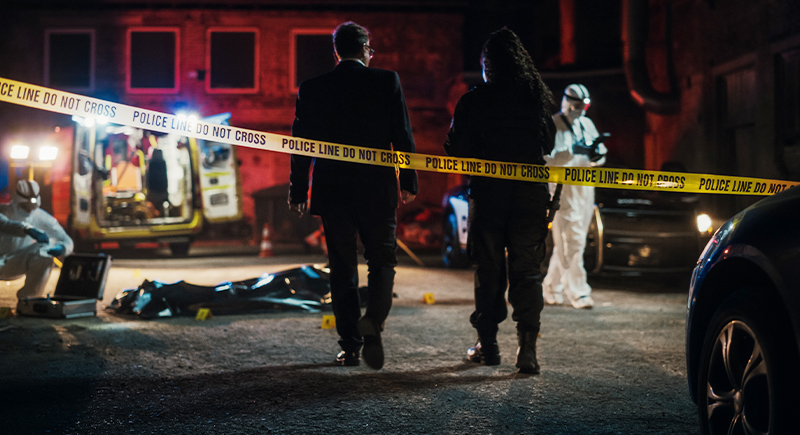The Dark and Fascinating Psychology Behind Our Love of True Crime
Our fascination with true crime often begins harmlessly enough. Maybe it’s a late-night podcast about a missing person, or a docuseries you put on while scrolling through your phone. Before long, you’ve heard every theory, binged every episode, and caught yourself giving the neighbor with a shovel a second look.
True crime isn’t just entertainment anymore; it’s a full-blown cultural fixation. But why are we so hooked on stories that send chills down our spines? And what is it about hearing the worst of humanity that keeps us coming back for more?
Curiosity and the Pull of the Unthinkable

Image via Getty Images/vorDa
Essentially, true crime feeds the same curiosity that drives us to slow down at car wrecks or read mystery novels. Psychologists call it “morbid curiosity,” a natural urge to understand danger without facing it directly.
According to research published in the National Library of Medicine, our brains actually reward us for engaging with disturbing content. The study found that viewing violent or unsettling images triggers the brain’s reward centers, which may explain why people lean in rather than look away.
This curiosity often stems from a need to understand what makes people do unthinkable things. It’s human nature to ask why someone could cross such moral lines and why a mind could twist so far from empathy. Hearing these stories gives us a glimpse into the darker corners of human behavior, almost like studying chaos from behind glass.
The Comfort of Solving a Mystery
True crime taps into another powerful instinct to solve puzzles. Each case presents a mystery waiting to be cracked, and that suspense keeps audiences glued. Listeners and viewers play detective and find themselves piecing together clues before the big reveal.
Legal experts say part of the appeal lies in justice itself. We want to see wrongs made right and to believe that evil can be caught and punished. It restores a sense of order in a chaotic world. That emotional payoff, when the bad guy is caught or a mystery is solved, can feel deeply satisfying and even reassuring. As one criminology professor explained, this quest for justice helps us preserve faith in a system that doesn’t always deliver it in real life.
Fear, Safety, and the Survival Instinct

Image via iStockphoto/gorodenkoff
It may sound strange, but true crime can make people feel safer. By watching others’ worst nightmares unfold, we subconsciously prepare for our own. Many fans, especially women, admit they tune in to learn what not to do.
Psychologists say this behavior connects to our survival instinct and that we analyze threats to avoid them ourselves. But too much exposure to violence can backfire. The Cleveland Clinic warns that excessive consumption can heighten anxiety, make people overly cautious, and even fuel paranoia.
Checking locks twice or avoiding social outings can be signs the habit has crossed into stress territory. Experts recommend balance by mixing crime shows with lighter content and taking breaks to reset.
A Long History of Dark Fascination
While podcasts and Netflix series have amplified the genre, our interest in crime is centuries old. In the 1700s and 1800s, people attended public executions like community events. Newspapers sold out by sensationalizing murder trials, and serial killers became celebrity figures long before television existed. Today’s streaming queues could simply be the modern version of those old crowds gathering around the gallows.
Even now, the same questions from the past echo: What drives someone to kill? Could anyone be capable of it? Are monsters born, or made? Those questions have no easy answers, and maybe that’s the point. The mystery itself keeps us fascinated.
Experts agree that curiosity about crime isn’t unhealthy by itself. It’s when fascination turns into fixation that it can take a toll. Consuming stories about violence in moderation can teach awareness and empathy, but overdoing it can distort our sense of safety and trust.
Still, for most people, true crime isn’t about glorifying killers. It’s about trying to understand them, to make sense of the senseless, and maybe to reassure ourselves that good can still triumph over evil. It’s about confronting fear, learning through other people’s stories, and exploring the limits of the human mind safely.